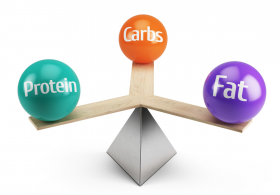Meredith Biggart MS, RD, LDN
“I just cut out [fill in the blank] from my diet and I feel great!”
If I had a nickel for every time I’ve heard a statement like this, I would have a big bag of nickels. After a few weeks or months, that same person is irritable, exhausted, foggy-brained and giving up on the diet that was the next best thing, leaving him/her confused as ever when deciding what the next steps should be in his/her quest for wellness.
Why is the story always the same? All diets, and I mean all of them, make claims that are unrealistic and are not sustainable for an extended time period. The name of these popular diets says it all “For A Day” diets. They were never intended to be sustainable. Almost all of them recommend the restriction or elimination of entire food groups for various reasons. These reasons often border on nonsensical.
MACRO MYTHS
1. Eating Fat is Unhealthy
By the end of the 1980s the concept of fats as the demon was solidified. However, this concept, surprisingly, continues to remain a go-to method of wellness for many today.
Thanks to constantly evolving nutrition sciences, the benefits of fat have been making their way into the mainstream media. The role of eating fats for a healthy body include, but not limited to:
- Hormone regulation
- Cellular function
- Energy stores
- Vitamin absorption
- Temperature regulation
- Essential nutrients only provided by fat
Additionally, stripping fat from food during processing takes away vital components of satisfaction from food such as texture, taste and aroma. When we do this, manufacturers must replace those enjoyable characteristics artificially.
2. Carbs Are Your Enemy
As fats have been slowly let back into the “circle of trust,” the focus of our attention has shifted to sugars, which are the simplest form of carbohydrates — the components of food groups such as grains, vegetables, fruits and some dairy products.
Carbohydrates are crucial to our diet. They are the only macronutrient that can provide energy to the brain. Many may argue that you can live off little to no carbs, but what they might not realize is that our body has its own way of overriding our dietary choices.
If a person does not get enough carbohydrates, his/her body will make its own from the fat and/or protein eaten. This is not an ideal way to reduce fat stores. Please re-read myth number 1! The process of converting fat or proteins to carbohydrates for energy not only requires extra energy and time, it also can be very dangerous, causing fluctuations in the body’s pH levels.
3. Too much protein damages your kidneys
High protein consumption can certainly be an issue for individuals who have compromised kidneys. Anyone with a medical-related diagnosis should be working with a registered dietitian to customize their protein intake through medical nutrition therapy services.
For the rest of us, it is okay to consume protein levels higher than the recommended .08g per kg. Bodies do not have sufficient ways to store protein and thus, excess protein beyond an individual’s need, is excreted in urine. Kidneys are filtration devices that are well-equipped to handle the task. Because bodies can’t store protein, a healthy diet must include an adequate amount of protein to gain the following functional benefits:
- Tissue and cellular repair
- Wound healing
- DNA synthesis
- Enzymes for a host of metabolic functions
- Immune functions
All macros play a vital role in our bodies. Restricting or eliminating any macro nutrients in the absence of a medical condition, may provide a temporary decline in our overall health and wellness.
So the next time you overhear someone talking about that new diet that consists of restricting X,Y or Z, know that all macros matter!
